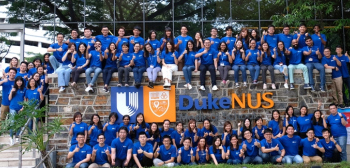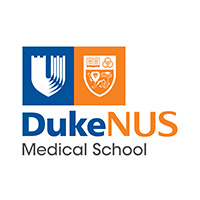Duke-NUS Medical School
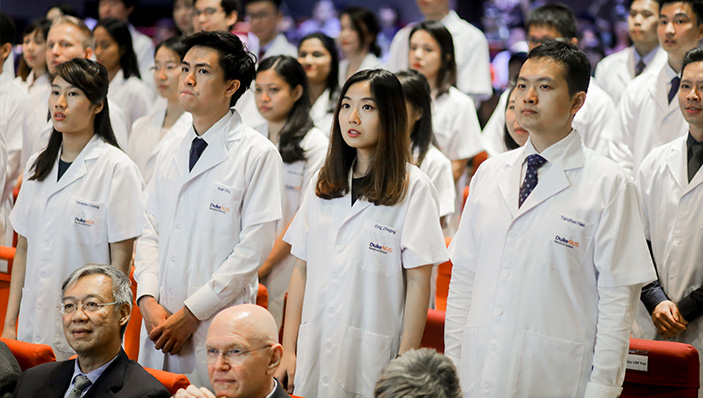
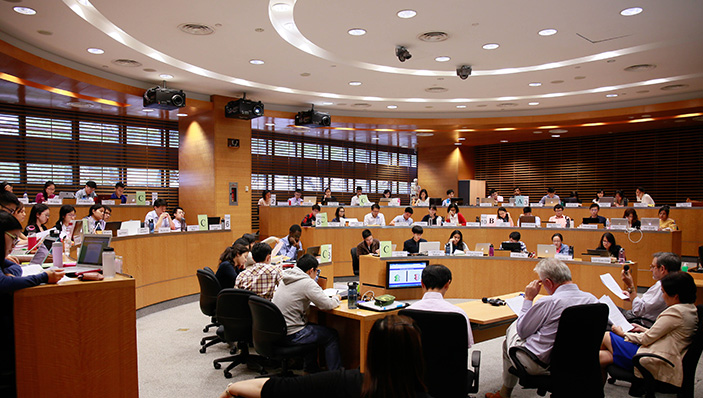






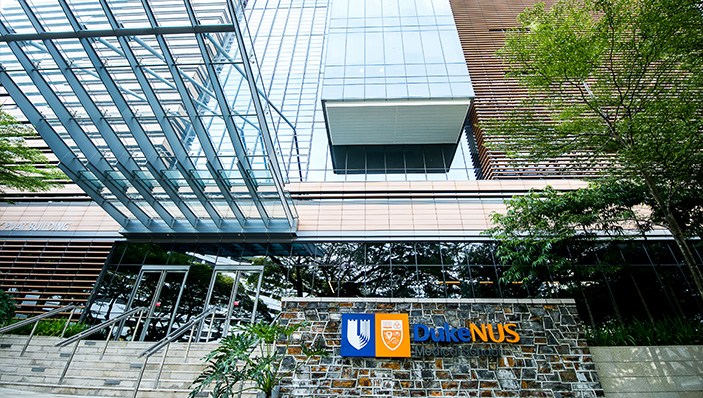











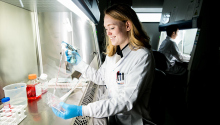



About
Transforming Medicine, Improving Lives
Established in 2005 through a partnership between Duke University School of Medicine in the USA and National University of Singapore, Duke-NUS provides a critical learning environment that draws from the best of both universities to prepare doctors and scientists who can transform the practice of medicine and improve lives.
Duke-NUS Medical School (Duke-NUS) offers robust graduate-entry medical education that is positioned to meet the changing medical landscape and the future healthcare needs of Singapore. Our programmes include the Doctor of Medicine (MD) degree, PhD in Integrated Biology and Medicine (IBM) degree, and PhD in Quantitative Biology and Medicine degree (QBM).
Through the MD programme, Duke-NUS prepares doctors who embody the School’s education mission of “Clinicians First, Clinicians Plus”, well equipped to practice in the complex world of medicine, as well as play increasingly critical roles in translating meaningful scientific discoveries into quality innovations in patient care. To this end, the curriculum is designed for students to acquire and improve upon the knowledge, skills, and attitudes required of any medical practitioner: professionalism and ethics, medical knowledge, communication skills, and clinical experience. Complementing these are skills necessary to improve medical practice, such as research, teamwork, leadership, and creative and critical thinking skills.
As the only US-style graduate-entry medical school in Singapore, over 28 different nationalities and a variety of different bachelor degrees are represented in the Duke-NUS student community. Together with Singapore Health Services (SingHealth) as the strategic partner in Academic Medicine, Duke-NUS is poised to transform medicine with its integrated expertise in clinical care, education and research that are focused on transforming medicine and improving patients’ lives.
Enriching Campus Life
Students can enjoy a wide range of activities that enhance their academic experience. These activities foster a sense of community and cultivate personal growth.
College System
There are four advisory colleges at Duke-NUS that offer support for students’ professional and personal growth. These colleges provide mentorship, peer support and opportunities for community service. This environment enables students to better cope with the challenges of medical training and develop social skills and values.
Student Interest Groups
Duke-NUS student interest groups, from academic to cultural, are initiated and developed by students themselves. These groups provide an additional outlet for students to channel their energy and pursue their passion.
Community Service
At Duke-NUS, we encourage active participation in community service projects, so as to foster values such as empathy, leadership and teamwork. Student groups and colleges offer a range of worthy projects in which students can invest their time and efforts.
Student Wellness
To help students cope with the rigour of a demanding academic programme, Duke-NUS offers extensive support for students’ personal wellness through activities such as exercise classes on campus, mindfulness workshops and referral resources.
Holistic Admission Process
In keeping with our School’s mission, and our Academic Medicine partnership with SingHealth, our ambition is to make significant contributions to improving the practice of medicine in Singapore and beyond. If you have the ambition to make a difference, we encourage you to apply for the Duke-NUS programmes and contribute to realising our vision.
Pre-requisites
MD and MD-PhD Track
- Bachelor’s degree in any discipline
- Medical College Admission Test (MCAT) or Graduate Medical School Admissions Test (GAMSAT) score
PhD in Integrated Biology and Medicine (IBM)
- Bachelor's degree in any discipline
- Graduate Record Examination (GRE) General Test results
- Research experience is looked upon favourably
PhD in Quantitative Biology and Medicine (QBM)
- For Biostatistics and Health Data Science concentration: a master’s degree or a bachelor’s degree in a quantitative discipline (Stat/Biostatistics/Math/Computer Science/Epidemiology)
- For Computational Biology concentration: a bachelor’s degree in biological, computational, or quantitative discipline
- Graduate Record Examination (GRE) General Test results
How to Apply
Applications to Duke-NUS programmes open in June preceding the year of intake.
MD and MD-PhD Track
Deadline for early application – 1 September preceding the year of intake
Final deadline – 31st January in the year of intake
PhD Programmes (IBM & QBM)
Final deadline – 15th January in the year of intake
To apply, candidates must submit the following:
- An online application, including written essays, at https://myportal.duke-nus.edu.sg/admissions
- Three to five recommendation letters (typically from professors, mentors and/or employers)
- Official transcripts from Bachelor’s (and higher, if applicable) degree programme(s)
- World Education Services (WES) report, where required
As an aspiring medical student, you understand that the journey of becoming a clinician is long and tough. There are many factors to consider when deciding on where to study, including school reputation, residency options, school environment, cost of tuition, financial aid availability. At Duke-NUS Medical School, we understand your concerns and have put together a six-part webinar series to address all that you need to know.
Episode 2 will introduce the graduate-entry MD programme offered at Duke-NUS, including an in-depth look the curriculum. Our speaker will also go over our team-based teaching methodology known as TeamLEAD and our valuable partnership with SingHealth, Singapore's largest healthcare provider.
Register now and join us on 9 September 2019, 10am (GMT+8) for Episode 2, hosted by Professor London Lucien Ooi, Associate Dean of Recruitment, Admissions & Financial Aid.
You may also view past episodes and other student videos at our Content Hub.
About
Transforming Medicine, Improving Lives
Established in 2005 through a partnership between Duke University School of Medicine in the USA and National University of Singapore, Duke-NUS provides a critical learning environment that draws from the best of both universities to prepare doctors and scientists who can transform the practice of medicine and improve lives.
Duke-NUS Medical School (Duke-NUS) offers robust graduate-entry medical education that is positioned to meet the changing medical landscape and the future healthcare needs of Singapore. Our programmes include the Doctor of Medicine (MD) degree, PhD in Integrated Biology and Medicine (IBM) degree, and PhD in Quantitative Biology and Medicine degree (QBM).
Through the MD programme, Duke-NUS prepares doctors who embody the School’s education mission of “Clinicians First, Clinicians Plus”, well equipped to practice in the complex world of medicine, as well as play increasingly critical roles in translating meaningful scientific discoveries into quality innovations in patient care. To this end, the curriculum is designed for students to acquire and improve upon the knowledge, skills, and attitudes required of any medical practitioner: professionalism and ethics, medical knowledge, communication skills, and clinical experience. Complementing these are skills necessary to improve medical practice, such as research, teamwork, leadership, and creative and critical thinking skills.
As the only US-style graduate-entry medical school in Singapore, over 28 different nationalities and a variety of different bachelor degrees are represented in the Duke-NUS student community. Together with Singapore Health Services (SingHealth) as the strategic partner in Academic Medicine, Duke-NUS is poised to transform medicine with its integrated expertise in clinical care, education and research that are focused on transforming medicine and improving patients’ lives.
Enriching Campus Life
Students can enjoy a wide range of activities that enhance their academic experience. These activities foster a sense of community and cultivate personal growth.
College System
There are four advisory colleges at Duke-NUS that offer support for students’ professional and personal growth. These colleges provide mentorship, peer support and opportunities for community service. This environment enables students to better cope with the challenges of medical training and develop social skills and values.
Student Interest Groups
Duke-NUS student interest groups, from academic to cultural, are initiated and developed by students themselves. These groups provide an additional outlet for students to channel their energy and pursue their passion.
Community Service
At Duke-NUS, we encourage active participation in community service projects, so as to foster values such as empathy, leadership and teamwork. Student groups and colleges offer a range of worthy projects in which students can invest their time and efforts.
Student Wellness
To help students cope with the rigour of a demanding academic programme, Duke-NUS offers extensive support for students’ personal wellness through activities such as exercise classes on campus, mindfulness workshops and referral resources.
Holistic Admission Process
In keeping with our School’s mission, and our Academic Medicine partnership with SingHealth, our ambition is to make significant contributions to improving the practice of medicine in Singapore and beyond. If you have the ambition to make a difference, we encourage you to apply for the Duke-NUS programmes and contribute to realising our vision.
Pre-requisites
MD and MD-PhD Track
- Bachelor’s degree in any discipline
- Medical College Admission Test (MCAT) or Graduate Medical School Admissions Test (GAMSAT) score
PhD in Integrated Biology and Medicine (IBM)
- Bachelor's degree in any discipline
- Graduate Record Examination (GRE) General Test results
- Research experience is looked upon favourably
PhD in Quantitative Biology and Medicine (QBM)
- For Biostatistics and Health Data Science concentration: a master’s degree or a bachelor’s degree in a quantitative discipline (Stat/Biostatistics/Math/Computer Science/Epidemiology)
- For Computational Biology concentration: a bachelor’s degree in biological, computational, or quantitative discipline
- Graduate Record Examination (GRE) General Test results
How to Apply
Applications to Duke-NUS programmes open in June preceding the year of intake.
MD and MD-PhD Track
Deadline for early application – 1 September preceding the year of intake
Final deadline – 31st January in the year of intake
PhD Programmes (IBM & QBM)
Final deadline – 15th January in the year of intake
To apply, candidates must submit the following:
- An online application, including written essays, at https://myportal.duke-nus.edu.sg/admissions
- Three to five recommendation letters (typically from professors, mentors and/or employers)
- Official transcripts from Bachelor’s (and higher, if applicable) degree programme(s)
- World Education Services (WES) report, where required
As an aspiring medical student, you understand that the journey of becoming a clinician is long and tough. There are many factors to consider when deciding on where to study, including school reputation, residency options, school environment, cost of tuition, financial aid availability. At Duke-NUS Medical School, we understand your concerns and have put together a six-part webinar series to address all that you need to know.
Episode 2 will introduce the graduate-entry MD programme offered at Duke-NUS, including an in-depth look the curriculum. Our speaker will also go over our team-based teaching methodology known as TeamLEAD and our valuable partnership with SingHealth, Singapore's largest healthcare provider.
Register now and join us on 9 September 2019, 10am (GMT+8) for Episode 2, hosted by Professor London Lucien Ooi, Associate Dean of Recruitment, Admissions & Financial Aid.
You may also view past episodes and other student videos at our Content Hub.
Campus locations
Duke-NUS Medical School,
8 College Road , Singapore , Singapore , 169857
Related content
